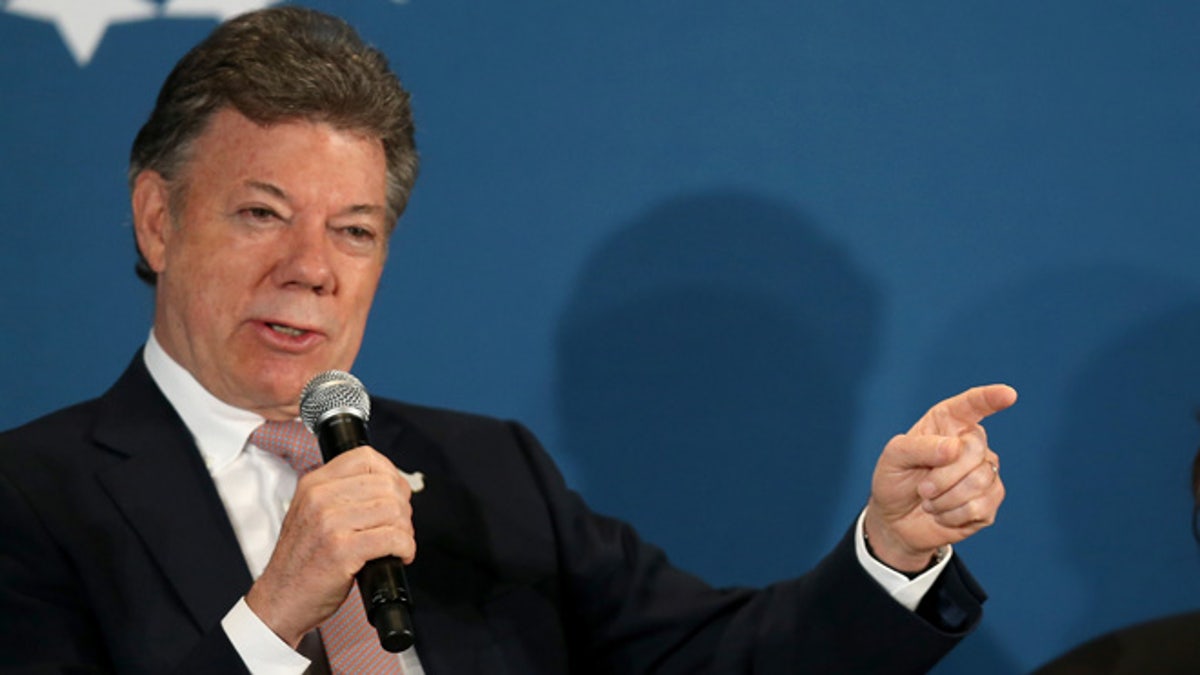
CORAL GABLES, FL - DECEMBER 11: Juan Manuel Santos, President of the Republic of Colombia, (L) and Susan Fonseca, Founder/CEO Woman@TheFrontier and Founding Member, Singularity University attend the Clinton Foundations Future of the Americas summit at the University of Miami on December 11, 2014 in Coral Gables, Florida. The summit is bringing together leaders from the private, public, and civic sectors across Latin America, the Caribbean, Canada, and the United States to work on economic prosperity, investment, and innovation opportunities across the Western Hemisphere. (Photo by Joe Raedle/Getty Images) ((Photo by Joe Raedle/Getty Images))
Bogotá, Colombia (AP) – Colombia's government took its biggest step yet toward an eventual end to hostilities in a half-century conflict by ordering an immediate halt to aerial bombings of guerrilla camps belonging to the nation's largest rebel group.
President Juan Manuel Santos, in a nationally televised address Tuesday night, said he made the decision because of progress that is being made in negotiations that started in 2012 with the Revolutionary Armed Forces of Colombia (FARC) and the rebels' adherence to a unilateral ceasefire it declared in December.
The president said the ban on aerial bombings would initially last a month but could be extended if the FARC continues to keep its guns down. He said aerial raids against the nation's second-largest rebel group, the National Liberation Army (ELN), would continue uninterrupted until such time as it decides to join the peace process.
The decision to stop the bombings, which had been rumored for weeks, temporarily removes one of the government's most-successful tools in its campaign against the rebels. Since 2008, three members of the FARC's ruling secretariat and countless troops have been killed as a result of surprise jungle raids involving the use of smart bombs.
Conservative opponents said the move is likely to demoralize Colombian troops and give valuable breathing room to rebels who've seen their ranks shrink by more than half to fewer than 6,000 combatants during a decade-long, U.S.-backed assault.
Santos in Tuesday's address urged his opponents to make their criticisms heard in a non-partisan commission he said he was establishing to advise him on how to proceed in the final, delicate stage of talks.
"I want to hear a lot of voices to help me make the right decision," Santos said.
The government and the FARC have already reached agreements on land reform, participation in politics for ex-rebels and a joint strategy to curb drug trafficking.
In the latest round of talks that ended Saturday in Havana, Cuba, the two sides also announced a joint effort to remove unexploded land mines.
But several tough issues remain, the thorniest of which is rebel negotiators' demand they avoid any jail time for atrocities allegedly committed by troops under their command.
